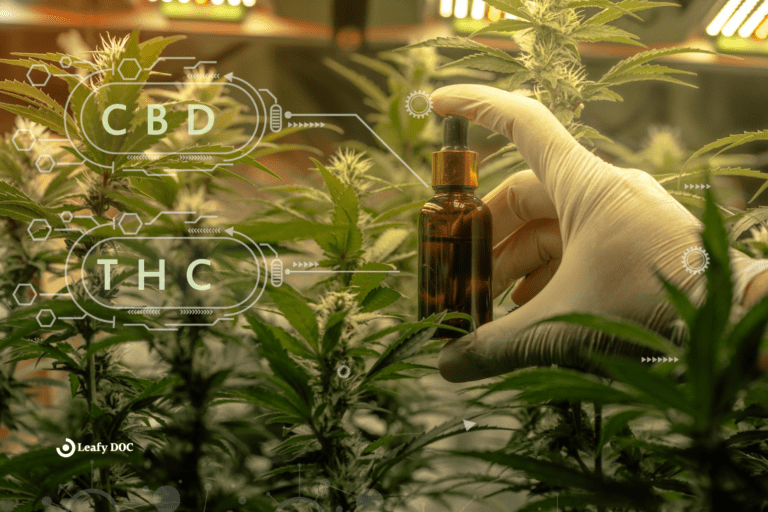Managing Anxiety: THC Vs CBD
by Tayyaba Amir · February 27, 2024
Discover the ultimate anxiety-buster: THC vs CBD for anxiety. Take control of your mental well-being today and find out which one is best for you. Click here to conquer anxiety once and for all!

Are you tired of feeling overwhelmed by anxiety? Do you long for a sense of calm and control in your life? If so, you’re not alone. Anxiety disorders affect millions of people worldwide, and finding effective management strategies can be a daunting task. Luckily, two natural remedies have been gaining popularity in recent years: THC and CBD.
In this article, we will explore the role of THC and CBD in managing anxiety, compare their benefits and side effects, and help you choose the right option for your anxiety management journey.
When it comes to managing anxiety, understanding the different options available is important. THC, or tetrahydrocannabinol, is the compound responsible for the psychoactive effects of cannabis. It is known for its ability to induce feelings of relaxation and euphoria. Many people turn to THC as a way to alleviate anxiety symptoms and find temporary relief from their worries.
However, it’s important to note that THC can also have side effects such as increased heart rate, impaired memory, and feelings of paranoia. So, while it may provide short-term relief, it’s essential to weigh the benefits against the potential drawbacks before incorporating THC into your anxiety management routine.
Key Takeaways
- THC is a psychoactive compound that provides immediate relief for anxiety symptoms, but it can also have side effects such as paranoia and increased heart rate.
- CBD, on the other hand, is a non-psychoactive compound that is generally well-tolerated, but it takes longer to take effect compared to THC.
- The choice between THC and CBD for anxiety management should be based on individual preferences and needs.
- It is important to consult with a healthcare professional when deciding between THC and CBD for anxiety management to ensure the best course of action.
Understanding Anxiety Disorders
Anxiety disorders are more than just feeling nervous or stressed out occasionally. They’re a group of mental health conditions that cause excessive and persistent worry, fear, and apprehension. Some common types of anxiety disorders include generalized anxiety disorder (GAD), panic disorder, social anxiety disorder, and specific phobias.
Generalized anxiety disorder is characterized by excessive worry and fear about everyday situations. People with GAD often find it difficult to control their worry and may experience physical symptoms such as restlessness, fatigue, muscle tension, and difficulty concentrating.
Panic disorder, on the other hand, is marked by recurrent panic attacks, which are sudden episodes of intense fear that come on without warning. These panic attacks can cause physical symptoms such as a racing heart, shortness of breath, trembling, and a sense of impending doom.
Social anxiety disorder, also known as social phobia, is an intense fear of social situations and being judged by others. People with social anxiety disorder may avoid social gatherings, public speaking, and other situations that may trigger their anxiety.
Finally, specific phobias are irrational fears of specific objects or situations, such as heights, spiders, or flying. These phobias can cause extreme anxiety and may lead to avoidance behaviors. Understanding the different types of anxiety disorders is the first step in managing and overcoming them. By recognizing the symptoms and seeking help, you can take control of your anxiety and live a more fulfilling life.
The Role of THC in Managing Anxiety
If you’re looking for a way to alleviate anxiety, did you know that THC, the psychoactive component in cannabis, has been found to have a calming effect in some individuals?
While THC is commonly associated with the “high” feeling, it can have positive effects on anxiety. Here are a few key points to consider:
- THC can help reduce anxiety by activating specific receptors in the brain that regulate emotions and mood.
- It can provide a sense of relaxation and calmness, which can be beneficial for individuals experiencing anxiety.
- Some research suggests that THC may also help with sleep, which is often disrupted by anxiety.
It’s important to note that the effects of THC on anxiety can vary from person to person. While some individuals may find it helpful, others may experience increased anxiety or paranoia.
It’s always best to consult with a healthcare professional before using THC as a treatment for anxiety. They can provide guidance and help determine the best approach for managing your anxiety safely and effectively.
The Role of CBD in Managing Anxiety
One key aspect of utilizing CBD in anxiety management is its potential to promote relaxation and reduce stress levels. CBD, or cannabidiol, is a compound found in cannabis plants that has been gaining popularity for its potential therapeutic benefits. Unlike THC, CBD doesn’t produce the same psychoactive effects and is non-intoxicating, making it a more appealing option for individuals seeking anxiety relief without the high.
CBD works by interacting with the body’s endocannabinoid system, which plays a role in regulating various physiological processes, including mood and stress response. Research suggests that CBD may help to reduce anxiety by activating certain receptors in the brain that influence serotonin levels, a neurotransmitter that’s often associated with feelings of well-being and happiness. By promoting relaxation and reducing stress levels, CBD may help to alleviate symptoms of anxiety and improve overall mental well-being.
In addition to its potential calming effects, CBD has also been found to have anti-inflammatory properties, which could further contribute to its efficacy in managing anxiety. Chronic inflammation has been linked to the development of various mental health disorders, including anxiety and depression. By reducing inflammation in the body, CBD may help improve overall brain function and reduce anxiety symptoms.
Overall, CBD shows promise as a natural alternative for managing anxiety. Its potential to promote relaxation, reduce stress levels, and alleviate symptoms of anxiety makes it an appealing option for those seeking relief. However, it’s important to note that everyone’s experience with CBD may vary, and it’s always recommended to consult with a healthcare professional before incorporating any new treatments into your anxiety management routine.
Comparing the Benefits and Side Effects of THC and CBD
When comparing the benefits and side effects of THC and CBD, you may argue that the potential psychoactive effects of THC can be a concern. THC, or tetrahydrocannabinol, is the compound in cannabis that’s responsible for the “high” sensation. This psychoactive effect can be enjoyable for some individuals, but it may also cause feelings of anxiety or paranoia in others.
On the other hand, CBD, or cannabidiol, doesn’t produce these psychoactive effects. This means that CBD can provide the potential benefits of anxiety relief without the risk of feeling “high” or experiencing negative side effects.
Here are three sub-lists to help you understand the benefits and side effects of THC and CBD:
Benefits of THC:
- Potential pain relief: THC has been found to have analgesic properties, making it effective in managing chronic pain.
- Improved appetite stimulation: THC can help stimulate appetite, making it beneficial for individuals experiencing loss of appetite due to medical conditions or treatments.
- Relaxation and stress relief: THC has been reported to have calming effects, providing relaxation and stress relief for some individuals.
Side effects of THC:
- Psychoactive effects: The psychoactive properties of THC can lead to feelings of anxiety, paranoia, or even panic attacks in some individuals.
- Impairment of cognitive function: THC can impair memory, concentration, and overall cognitive function, affecting daily activities and tasks.
- Increased heart rate: THC can cause an increase in heart rate, which may be concerning for individuals with heart conditions or high blood pressure.
Benefits of CBD:
- Anxiety relief: CBD has been shown to have potential anxiolytic effects, helping to reduce feelings of anxiety and promote relaxation.
- Anti-inflammatory properties: CBD has been found to have anti-inflammatory properties, making it beneficial for individuals with inflammatory conditions such as arthritis.
- Potential neuroprotective effects: CBD has been studied for its potential neuroprotective properties, showing promise in conditions such as epilepsy and neurodegenerative diseases.
It’s important to note that the effects of THC and CBD can vary from person to person, and it’s always recommended to consult with a healthcare professional before incorporating cannabis products into your anxiety management routine.
Choosing the Right Option for Your Anxiety Management
To choose the right option for managing your anxiety, it’s important to consider what works best for you. While both THC and CBD have been shown to have potential benefits for anxiety management, they have different effects and side effects that may influence your decision.
Let’s take a look at a comparison table to help you make an informed choice:
| Factors | THC | CBD |
|---|---|---|
| Psychoactive | Yes | No |
| Anxiety Relief | Can provide immediate relief | May provide more gradual relief |
| Side Effects | May cause paranoia, | Generally well-tolerated, |
| anxiety, and increased | but can cause drowsiness | |
| heart rate |
As you can see, THC is psychoactive and may provide immediate relief for anxiety symptoms. However, it can also cause side effects such as paranoia and increased heart rate, which may not be ideal for everyone. CBD, on the other hand, is non-psychoactive and generally well-tolerated, but it may take longer to take effect.
Ultimately, the choice between THC and CBD for anxiety management should be based on your individual preferences and needs. It’s important to consult with a healthcare professional who can guide you in making the best decision for your specific situation. What works for one person may not work for another, so it’s important to find the option that works best for you.
Frequently Asked Questions
What are some non-pharmacological methods for managing anxiety?
Take a deep breath and imagine you’re a captain steering your ship through stormy waters. Just like navigating anxiety, finding non-pharmacological methods like deep breathing, meditation, and exercise can help you stay in control and calm the storm within.
Can THC or CBD be used to treat other mental health conditions besides anxiety?
THC and CBD have been studied for their potential in treating various mental health conditions. While THC may worsen symptoms of certain conditions, CBD shows promise in managing conditions like depression, PTSD, and schizophrenia.
Are there any potential long-term side effects of using THC or CBD for anxiety?
Using THC or CBD for anxiety can have potential long-term side effects. These effects, like shadows lurking in the night, may include memory issues, cognitive impairments, and dependency. Proceed with caution, my friend.
How do THC and CBD interact with other medications commonly used to treat anxiety?
When it comes to managing anxiety, it’s important to consider how THC and CBD interact with other medications commonly used. They can have potential interactions, so it’s essential to consult with a healthcare professional before combining them.
Is there a difference in the effectiveness of THC and CBD for different types of anxiety disorders?
When it comes to different anxiety disorders, THC and CBD can have varying effects. THC may work better for some, while CBD may be more effective for others. It really depends on what works best for you and your specific needs.
Last Updated: August 8, 2024
Get Approved for Your Medical Marijuana Card in Minutes!

Get Your Medical Card
Connect with a licensed physician online in minutes

Like This Article?
Share with your friends
Table of Contents
Keep Reading
-
Understanding The Qualifications For Medical Marijuana Doctors
Unlock the Path to Becoming a Medical Marijuana Doctor – Learn the Crucial Qualifications Needed Today! Start your rewarding journey in this growing field and seize the opportunities now.
-
4 Steps to Obtain Your Florida Marijuana Card Easily
Learn how to easily obtain your Florida marijuana card with our four simple steps.
-
THC vs. CBD: Which is Best for Your Medical Condition?
Learn about the difference between THC and CBD and which one is best for your medical condition. Discover the unique properties of each cannabinoid and how they can be used for treatment.


